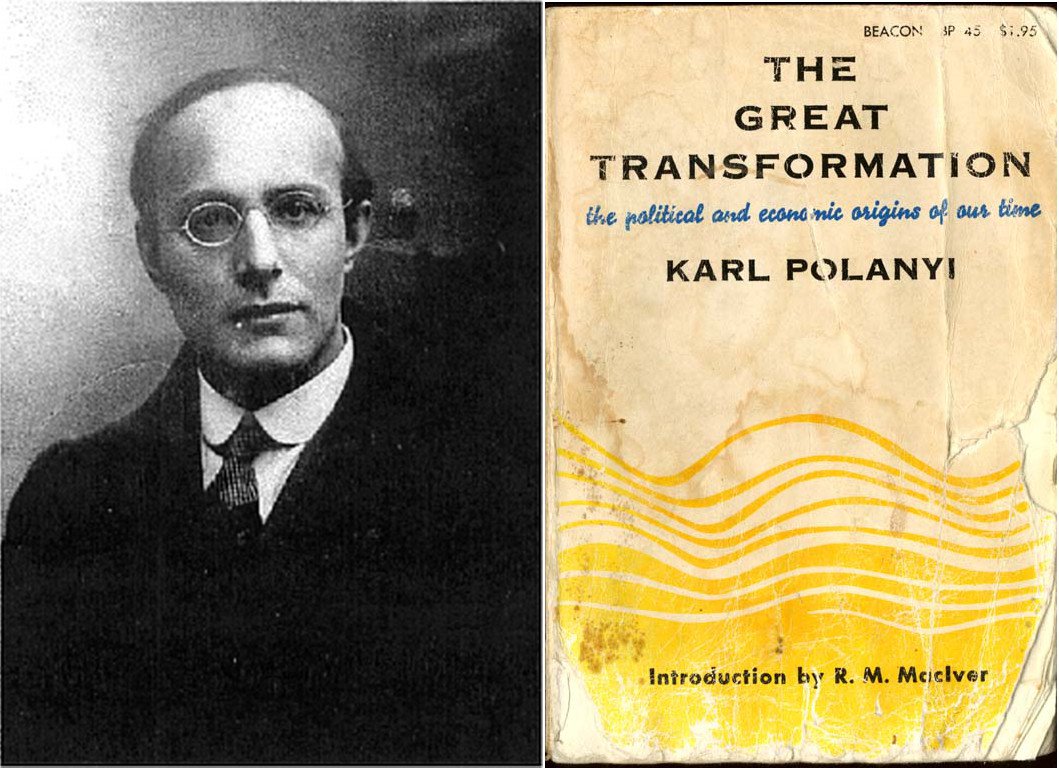Karl Polanyi, one of the twentieth century’s most insightful and influential socialist thinkers, passed away exactly 60 years ago. His masterpiece, The Great Transformation, remains the most powerful critique yet produced of market liberalism — the belief that societies can and should be organised through self-regulating markets. This is one of my favourite quotes from the book, which perfectly sums up the nature of contemporary neoliberalism, characterised by all-powerful states that have to employ increasingly authoritarian measures to impose the logic of capital:
“There was nothing natural about laissez-faire; free markets could never have come into being merely by allowing things to take their course. Just as cotton manufactures — the leading free trade industry — were created by the help of protective tariffs, export bounties, and indirect wage subsidies, laissez-faire itself was enforced by the state. The thirties and forties saw not only an outburst of legislation repealing restrictive regulations, but also an enormous increase in the administrative functions of the state, which was now being endowed with a central bureaucracy able to fulfil the tasks set by the adherents of liberalism.
The road to the free market was opened and kept open by an enormous increase in continuous, centrally organized and controlled interventionism. To make Adam Smith’s ‘simple and natural liberty’ compatible with the needs of a human society was a most complicated affair.
Just as, contrary to expectation, the invention of labor- saving machinery had not diminished but actually increased the uses of human labor, the introduction of free markets, far from doing away with the need for control, regulation, and intervention, enormously increased their range. Administrators had to be constantly on the watch to ensure the free working of the system. Thus even those who wished most ardently to free the state from all unnecessary duties, and whose whole philosophy demanded the restriction of state activities, could not but entrust the self-same state with the new powers, organs, and instruments required for the establishment of laissez-faire”.
Karl Polanyi, een van de meest inzichtelijke en invloedrijke socialistische denkers van de twintigste eeuw, overleed precies zestig jaar geleden. Zijn meesterwerk, The Great Transformation, blijft de krachtigste kritiek die tot nu toe is geproduceerd op het marktliberalisme – de overtuiging dat samenlevingen kunnen en moeten worden georganiseerd via zelfregulerende markten. Dit is een van mijn favoriete citaten uit het boek, die perfect de aard van het hedendaagse neoliberalisme samenvat, gekenmerkt door almachtige staten die steeds autoritairere maatregelen moeten nemen om de logica van het kapitaal op te leggen:
“Er was niets natuurlijks aan laissez-faire; Vrije markten hadden nooit tot stand kunnen komen louter door de dingen hun gang te laten gaan. Net zoals de katoenproductie – de leidende vrijhandelsindustrie – tot stand kwam met behulp van beschermende tarieven, exportpremies en indirecte loonsubsidies, werd laissez-faire zelf door de staat afgedwongen. In de jaren dertig en veertig was er niet alleen sprake van een uitbarsting van wetgeving die restrictieve regelgeving introk, maar ook van een enorme toename van de administratieve functies van de staat, die nu werd voorzien van een centrale bureaucratie die in staat was de taken te vervullen die de aanhangers van het liberalisme hadden opgelegd.
De weg naar de vrije markt werd geopend en opengehouden door een enorme toename van het voortdurende, centraal georganiseerde en gecontroleerde interventionisme. Het was een uiterst gecompliceerde aangelegenheid om de 'eenvoudige en natuurlijke vrijheid' van Adam Smith verenigbaar te maken met de behoeften van een menselijke samenleving.
Net zoals, tegen de verwachting in, de uitvinding van arbeidsbesparende machines het gebruik van menselijke arbeid niet had verminderd, maar zelfs vergroot, heeft de introductie van vrije markten de behoefte aan controle, regulering en interventie verre van weggenomen, maar juist de omvang ervan enorm doen toenemen. bereik. Beheerders moesten voortdurend waakzaam zijn om de vrije werking van het systeem te garanderen. Dus zelfs degenen die de staat het vurigste wilden bevrijden van alle onnodige plichten, en wier hele filosofie de beperking van staatsactiviteiten eiste, konden niet anders dan dezelfde staat de nieuwe bevoegdheden, organen en instrumenten toevertrouwen die nodig zijn voor de oprichting van een staat. laissez-faire”.
Klopte deze vertaling? Geef ons feedback zodat wij verbeteringen kunnen doorvoeren:






Geen opmerkingen:
Een reactie posten